March 16, 2013, Saturday — Black Shoes
“First of all I would say a prayer for our Bishop Emeritus Benedict XVI. Let us all pray together for him, that the Lord bless him and Our Lady protect him.” –Pope Francis, asking all to pray for Emeritus Pope Benedict, during his first public words after his election on March 13, 2013
It is now official. Pope Francis, 76, will go to Castel Gandolfo, about 15 miles outside of Rome, to meet Emeritus Pope Benedict, 85, on March 23, next Saturday, one week from today.
It will be their first meeting since Benedict renounced his office and since Francis was elected Pope on Wednesday, three days ago.
But it will not be their first meeting ever; the two have met before. Here below are two photos of Pope Benedict meeting with Cardinal Bergoglio, who is now Pope Francis.
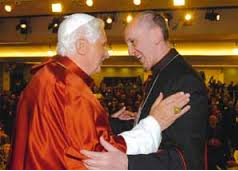
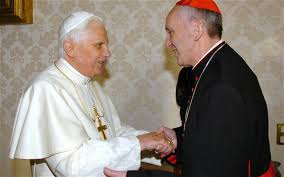 According to a Vatican communique issued today, Pope Francis will leave by helicopter from the Vatican at 12 noon and arrive at 12:15 p.m. at Castel Gandolfo, where he will join the Emeritus Pope for lunch.
According to a Vatican communique issued today, Pope Francis will leave by helicopter from the Vatican at 12 noon and arrive at 12:15 p.m. at Castel Gandolfo, where he will join the Emeritus Pope for lunch.
Pope Francis has already rendered homage to Pope Emeritus Benedict on several occasions during the first three days of his pontificate, beginning with a telephone call to the Emeritus Pope on Wednesday evening, the night of his election.
Then, standing on the balcony of St. Peter’s, Francis asked the crowd below in the Square to pray for Benedict, and prayed the Our Father, Hail Mary and Glory Be, in Latin.
On Friday, on the occasion of a meeting with his cardinals, Francis recalled the “goodness” of his predecessor, and rrefreered to his decision to step down as a “courageous and humble” gesture.
Benedict XVI, 85, left the papal office on February 28, 16 days ago.
He is expected to return to the Vatican at the end of April, and to move in to a convent in the Vatican Gardens. It is not yet clear what his relationship will be with his successor, or how often they will meet, if at all.
One difference between the two, however, has already become evident. Pope Francis is not wearing the “red shoes” that past Popes have typically worn.
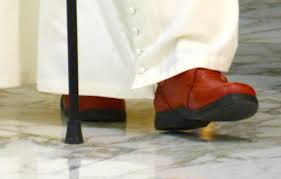 This tradition goes back more than 200 years. Here are Pius VII’s slippers from 1808, 205 years ago:
This tradition goes back more than 200 years. Here are Pius VII’s slippers from 1808, 205 years ago:
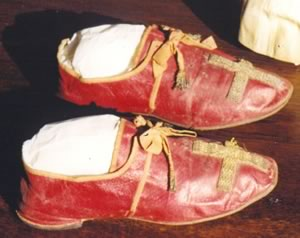 So, it is a tradition. It isn’t a very important tradition. It has no doctrinal significance, of course. But it is a tradition.
So, it is a tradition. It isn’t a very important tradition. It has no doctrinal significance, of course. But it is a tradition.
And Francis, so far, is not following this tradition.
Since his election, Francis has worn an ordinary pair of black shoes, apparently rejecting the red leather shoes worn by Benedict XVI.
Benedict’s red shoes were hand-made for him by a cobbler in the Borgo, the old area of medieval streets just next to the Vatican on the right side of St. Peter’s Square.
A pair of the red shoes had been made for his successor and were on display in the days before the conclave.
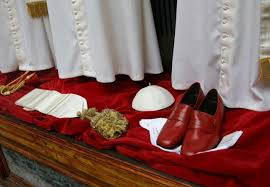 But, Pope Francis has not worn those red shoes. He has worn his old black shoes.
But, Pope Francis has not worn those red shoes. He has worn his old black shoes.
Reports says that, before he left Buenos Aires for Rome, Cardinal Bergoglio, was wearing a pair of shoes so shabby that friends insisted on buying him a new pair.
“He’s always very humbly dressed and the shoes he was wearing were not in very good shape,” a South American priest told Vatican Radio.
Here is how he looked this morning as he entered the Paul VI Hall to geet some 5,000 journalists who had come to Rome to cover the Conclave and his election.
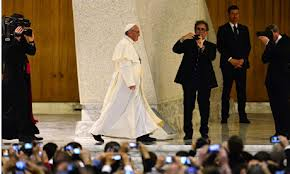 And he also wore these same black shoes on Thursday and Friday.
And he also wore these same black shoes on Thursday and Friday.
The New York Times commented: “[Francis] wore simple black shoes and an ordinary wristwatch with a thick black band to his first Mass as pontiff…. In an ancient institution where style often translates into substance, Francis, in his first 24 hours as Pope, has dramatically shifted the tone of the papacy. Whereas Benedict XVI, the pope emeritus, was a theologian who favored red loafers, ermine-lined cloaks and erudite homilies, reviving papal fashions from centuries past, Francis, the former Cardinal Jorge Mario Bergoglio of Buenos Aires, appeared Thursday to be sending a message of radical humility.”
Radical humility, radical simplicty, and a willingness to set aside traditional ways — these are three of the characteristics of this pontificate thus far.
The Love of the Poor as a Central Christian Mission
But this matter of red shoes and black shoes is not simply a matter of taste, or even of a desire for simplicity.
It is programmatic, or so it seems.
That means, Pope Francis is showing us his “program” by such small gestures.
And what is that program.
It is to set the love of the poor and downtrodden and miserable and despairing at the heart of the mission of the Pope, or the papacy, of the Church hierarchy, of the Church as a whole, and so, of individual Christians.
The Pope is telling us that, to be Christians, to bear witness to the love of Christ, to the reality of Christ and his love for us, shown in his life and his willingness to lay down his life for us on the cross, we must show our love for the poor and the downtrodden in real, practical, evident ways.
And he made this very clear this morning in his meeting with the 5,000 members of the press who are here in Rome.
On the third day after his election, Francis agreed — as has become customary, so in this he kept to tradition — to meet with the press.
Once again today, he departed from his written text, or notes, and told us why he had chosen the name “Francis.”
And why this choice of a name will mark his pontificate.
His pontificate will be centered on Christ, he said — and not on “the Pope” or “the Church” — but also on poverty, on the poor: “How I wish for a poor Church, and for a Church for the poor,” he told us.
“Never forget the poor”
The meeting was, in fact, extraordinary.
The Pope asked us if we wanted to know why he chose his name. And, of course, we did want to know. So we all listened intently.
“Do you know why the Bishop of Rome wanted to be called Francis?” he asked. “During the papal election, I had at my side the Archbishop Emeritus of Sao Paulo (Brazil), Cardinal Claudio Hummes. A great friend, a great friend…
(Here, Cardinal Claudio Hummes of Brazil, friend of the new Pope, whose suggestion to “never forget the poor” led Pope Francis to choose the name “Francis” as his papal name)
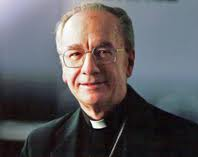
“This word stayed with me, the poor, the poor. And after that, thinking about the poor, I thought of St. Francis of Assisi. And then, while the vote-counting continued, I thought about war, until the end of the voting. And Francis is the man of peace. And it was thus that the name Francis came to me in my heart, Francis of Assisi. The man of poverty, the man of peace, the man who loved…”
And then the Pope paused for a moment, and spoke directly from his heart: “How I wish for a poor Church, and for a Church for the poor!”
Francis also told us how one of the cardinals suggested that he take the name Clement XV, to “pay back” Pope Clement the XIV, who suppressed the very powerful Jesuit Order of 250 years ago, in the late 1700s.
We all laughed…
There were also beautiful words in this talk about the Church. He stressed that the Church does not have a “political” nature, but is essentially something “spiritual.” And he stressed the centrality of Christ for the Church, not the Pope.
“Christ is the center!” he said. “Without Him, Peter and the Church would not exist and would have no reason to exist.”
“For the good of the Church”
And in this context, he spoke about Pope Benedict’s decision to renounced the papal throne.
“As Benedict XVI frequently reminded us, Christ is present in Church and guides her,” Pope Francis said. “In everything that has occurred, the principal agent has been, in the final analysis, the Holy Spirit.
“He prompted the decision of Benedict XVI for the good of the Church; he guided the Cardinals in prayer and in the election.”
This, he summed up, was the key to understanding the events of these recent days.
The silent blessing
And then Francis did something which surprised everyone, pleased many, and shocked a few.
The moment had come for him to impart to all of us his Apostolic Blessing, but he did not do this in the usual way.
In fact, he made no exterior gesture at all. He did not lift his hand, he did not move it in the form of a blessing, and he did not speak “in the name of the Father, and of the Son, and of the Holy Spirit” out loud.
He said, in Italian: “I cordially impart to all of you my blessing. Thank you.” And then, in Spanish, he explained as follows: “I told you I was cordially imparting my blessing. Since many of you are not members of the Catholic Church, and others are not believers, I cordially give this blessing silently, to each of you, respecting the conscience of each, but in the knowledge that each of you is a child of God. May God bless you!”
And with that, he turned and left.
One of my colleagues turned to me and said, “Where was the papal blessing?”
“He gave it silently,” I said. “He blessed us silently, without presupposing anything. He was trying to be respectful of individual consciences. This is not a purely religious gathering.”
“But it still seems like something is missing,” my friend said. “No blessing!”
“But there was a blessing,” I said. “We just could not see it. It is like what Ratzinger used to say, that in heaven, in the presence of God, there will no longer be any external rites or rituals to signify our worship, all those things will pass away, because the perfect will have come…”
“But are we already in heaven?” my friend replied.
“No,” I said. “But can’t we believe we are on the way?”
But my friend still was not satisfied. “I would have liked to have received a blessing from him,” he said.
“You did,” I said.
There will be more time in the future to reflect more deeply on these questions, which of course also have a relation to the liturgy. For the moment, it is enough to say that Pope Francis, also in this matter of giving a silent, not a public blessing to the journalists, did something without recent precedent, which is providing all of us with cause for meditation and inward conversion.
And that is what should be our thought at this time, just as Cardinal Hummes told Pope Francis as the vote total rose: “never forget the poor.” We should never forget our own need for conversion. We should be converted to Christ. We are ever in need of deeper conversion.
This is what Pope Francis is calling us to, if we can but hear him…
Curia Officials Reappointed — But Only “Temporarily”
Another important decision was announced today. Pope Francis reconfirmed all the heads of the Vatican Curia offices. But he did so only “donec aliter provideatur” (“until otherwise it may be provided” or “until other decisions are taken” or, perhaps most simply, “just for now”).
And in taking this decision, Francis was following tradition.
All new Popes restore their curial officials a day or two after their election, so that the Curia, which is “zeroed out” at the departure of one Pope, can be restored to a functioning body.
So, he followed tradition — but the phrasing of the decision means that, sometime soon, he is leaving the door still open to radical personnel changes in the Curia. It is just that he has not yet had time to take those decisions.
If he does not take such decisions within a few weeks, or months, that would suggest there is not going to be a “clean sweep” of the Curia.
So we do not yet know what Francis will do regarding the Curia.
Here is the official announcement in Italian, with the words “donec aliter provideatur” bold-faced:
COMUNICATO
Il Santo Padre Francesco ha espresso la volontà che i Capi e i Membri dei Dicasteri della Curia Romana, come pure i Segretari, nonché il Presidente della Pontificia Commissione dello Stato della Città del Vaticano, proseguano, provvisoriamente, nei rispettivi incarichi donec aliter provideatur.
Il Santo Padre desidera, infatti, riservarsi un certo tempo per la riflessione, la preghiera e il dialogo, prima di qualunque nomina o conferma definitiva.
Bollettino Ufficiale Santa Sede (16 marzo 2013)
Talk Today to Journalists
Here is the complete text of the Pope’s talk today to the 5,000 journalists from around the world in the Paul VI Audience Hall.
Some of the paragraphs below seem to have been prepared for the Pope by a member of the Curia, but large parts of the rest of the talk were either composed by the Pope himself, or are extemporaneous, that is, unscripted, especially his story of how he chose his name at the suggestion of Cardinal Hummes, his friend.
Address of the Holy Father
To Representatives of the Communications Media
Saturday, 16 March 2013
By Pope Francis
Dear Friends,
At the beginning of my ministry in the See of Peter, I am pleased to meet all of you who have worked here in Rome throughout this intense period which began with the unexpected announcement made by my venerable Predecessor Benedict XVI on 11 February last. To each of you I offer a cordial greeting.
The role of the mass media has expanded immensely in these years, so much so that they are an essential means of informing the world about the events of contemporary history.
I would like, then, to thank you in a special way for the professional coverage which you provided during these days – you really worked, didn’t you? – when the eyes of the whole world, and not just those of Catholics, were turned to the Eternal City and particularly to this place which has as its heart the tomb of Saint Peter. Over the past few weeks, you have had to provide information about the Holy See and about the Church, her rituals and traditions, her faith and above all the role of the Pope and his ministry.
I am particularly grateful to those who viewed and presented these events of the Church’s history in a way which was sensitive to the right context in which they need to be read, namely that of faith. Historical events almost always demand a nuanced interpretation which at times can also take into account the dimension of faith. Ecclesial events are certainly no more intricate than political or economic events!
But they do have one particular underlying feature: they follow a pattern which does not readily correspond to the “worldly” categories which we are accustomed to use, and so it is not easy to interpret and communicate them to a wider and more varied public.
The Church is certainly a human and historical institution with all that that entails, yet her nature is not essentially political but spiritual: the Church is the People of God, the Holy People of God making its way to encounter Jesus Christ. Only from this perspective can a satisfactory account be given of the Church’s life and activity.
Christ is the Church’s Pastor, but his presence in history passes through the freedom of human beings; from their midst one is chosen to serve as his Vicar, the Successor of the Apostle Peter.
Yet Christ remains the center, not the Sucessor of Peter: Christ, Christ is the centre.
Christ is the fundamental point of reference, the heart of the Church. Without him, Peter and the Church would not exist or have reason to exist.
As Benedict XVI frequently reminded us, Christ is present in Church and guides her. In everything that has occurred, the principal agent has been, in the final analysis, the Holy Spirit.
He prompted the decision of Benedict XVI for the good of the Church; he guided the Cardinals in prayer and in the election.
It is important, dear friends, to take into due account this way of looking at things, this hermeneutic, in order to bring into proper focus what really happened in these days.
All of this leads me to thank you once more for your work in these particularly demanding days, but also to ask you to try to understand more fully the true nature of the Church, as well as her journey in this world, with her virtues and her sins, and to know the spiritual concerns which guide her and are the most genuine way to understand her. Be assured that the Church, for her part, highly esteems your important work. At your disposal you have the means to hear and to give voice to people’s expectations and demands, and to provide for an analysis and interpretation of current events. Your work calls for careful preparation, sensitivity and experience, like so many other professions, but it also demands a particular concern for what is true, good and beautiful.
This is something which we have in common, since the Church exists to communicate precisely this: Truth, Goodness and Beauty “in person.” It should be apparent that all of us are called not to communicate ourselves, but this existential triad made up of truth, beauty and goodness.
Some people wanted to know why the Bishop of Rome wished to be called Francis. Some thought of Francis Xavier, Francis De Sales, and also Francis of Assisi. I will tell you the story.
During the election, I was seated next to the Archbishop Emeritus of São Paolo and Prefect Emeritus of the Congregation for the Clergy, Cardinal Claudio Hummes: a good friend, a good friend! When things were looking dangerous, he encouraged me.
And when the votes reached two thirds, there was the usual applause, because the Pope had been elected.
And he gave me a hug and a kiss, and said: “Don’t forget the poor!”
And those words came to me: the poor, the poor.
Then, right away, thinking of the poor, I thought of Francis of Assisi.
Then I thought of all the wars, as the votes were still being counted, till the end. Francis is also the man of peace. That is how the name came into my heart: Francis of Assisi.
For me, he is the man of poverty, the man of peace, the man who loves and protects creation; these days we do not have a very good relationship with creation, do we? He is the man who gives us this spirit of peace, the poor man … How I would like a Church which is poor and for the poor!
Afterwards, people were joking with me. “But you should call yourself Hadrian, because Hadrian VI was the reformer, we need a reform…” And someone else said to me: “No, no: your name should be Clement.” “But why?” “Clement XV: thus you pay back Clement XIV who suppressed the Society of Jesus!” These were jokes.
I love all of you very much, I thank you for everything you have done. I pray that your work will always be serene and fruitful, and that you will come to know ever better the Gospel of Jesus Christ and the rich reality of the Church’s life. I commend you to the intercession of the Blessed Virgin Mary, Star of Evangelization, and with cordial good wishes for you and your families, each of your families. I cordially impart to all of you my blessing. Thank you.
(In Spanish)
I told you I was cordially imparting my blessing. Since many of you are not members of the Catholic Church, and others are not believers, I cordially give this blessing silently, to each of you, respecting the conscience of each, but in the knowledge that each of you is a child of God. May God bless you!
Bartholomew To Attend March 19 Inauguration
It has been announced that the Patriarch of Constantinople, Bartholomew II, will attend the Mass of the Inauguration of Pope Francis, the first time this has happened since the Great Schism of 1054 A.D., on March 19, Feast of St. Joseph. Other Orthodox leaders with be present, including Metropolitan Hilarion of the Russian Orthodox Church.
This seems to be an act of appreciation of Benedict XVI’s outreach to the Orthodox Church and also a reminder that Catholic/Orthodox dialogue should be important in the Franciscan Pontificate, as should the recovery of our shared heritage, the Church has two lungs not one.
“Think nothing else but that God ordains all, and where there is no love, put love, and you will draw love out.” –St. John of the Cross
Francis’s Schedule for the next few days
On Sunday, 17 March at 12:00 pm, he will recite the first Angelus of his papacy from the papal apartments overlooking St. Peter’s Square, as is customary.
On Tuesday, 19 March, the Feast of St. Joseph, patron of the Church, the Mass to inaugurate the new papacy will be held at 9:30 am in St. Peter’s Square. No tickets will be issued for that Mass. All who wish may attend.
On Wednesday, 20 March, he will hold an audience with fraternal delegates representing the heads of the various Eastern rite Churches so there will not be a General Audience.
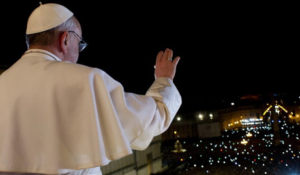







Facebook Comments